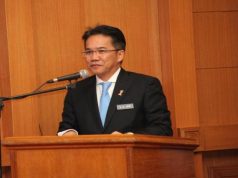 KUALA LUMPUR: Malaysia’s improvement in the Transparency International (TI) Corruption Perceptions Index (CPI) for 2019 shows the effectiveness of various anti-corruption efforts and institutional reform initiatives by the Pakatan Harapan (PH) government throughout 2019.
KUALA LUMPUR: Malaysia’s improvement in the Transparency International (TI) Corruption Perceptions Index (CPI) for 2019 shows the effectiveness of various anti-corruption efforts and institutional reform initiatives by the Pakatan Harapan (PH) government throughout 2019.
Minister in the Prime Minister’s Department Datuk Liew Vui Keong said these initiatives include the introduction of The National Anti-Corruption Plan 2019-2023 (NACP) which outlines 22 strategies with 115 anti-corruption initiatives to combat corruption in all sectors across the country.
He said other key institutional reform initiatives were also introduced such as the declaration of assets by all Ministers, Members of Parliament and the Prime Minister; introducing legislations to limit the tenure of the Prime Minister in office and efforts to establish an Independent Police Complaints of Misconduct Commission.
“This is however merely the beginning of a long road ahead with many more institutional reforms to unfold over 2020. These include a strengthening of the independence of the Malaysian Anti-Corruption Commission, strengthening of the independence of Parliament by reintroducing a Parliamentary Services Commission.
“We are also looking to replace the Official Secrets Act 1972 with a new Freedom of Information Act and strengthening The Whistleblower Protection Act 2010 to afford greater immunity and more avenues for whistleblowers to disclose information,” he said in a statement here today.
Malaysia has moved up 10 spots to the 51st position among 180 countries in the TI’s CPI for 2019, showing vast improvement in tackling corruption.
Malaysia’s score also improved to 53 out of 100 points on the CPI survey, an improvement from the 47 points it obtained the previous year.
The CPI scores and ranks are based on 13 surveys and expert assessments which measure the perceived level of corruption in a country’s public sector on a scale from zero (perceived to be highly corrupted) to 100 (perceived to be very clean).
— BERNAMA









